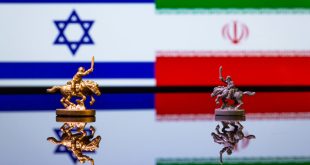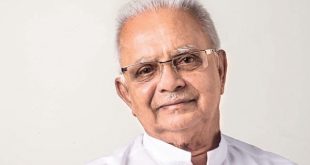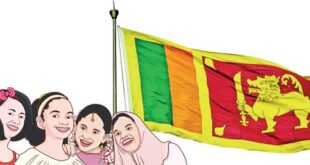Russia announced on April 16 that it had ended the war in Chechnya. The announcement was largely symbolic because for a long time, there had been no clashes in Grozny.

Wars can be won, but conflict resolution requires compromise and goodwill. In Chechnya this did not happen.
Might can be right, but not always. In a democracy where human rights are respected, the use of force should be resorted to with surgical precision only to the extent it is necessary. But in Chechnya, the use of force went beyond the limit. The example the Russians have set for other countries fighting internal rebellions was that it was not the means that mattered but the end.
A proud Russia, after two wars that spanned 15 years in Chechnya, now says the rebels have been totally routed.
There is no war in the Chechen capital of Grozny today. The rebels operate in the mountainous regions bordering Dagestan and Ingushetia, two Muslim-dominated regions, like Chechnya, within the Russia Federation.
To an outsider, Grozny today appears to be a booming city with construction cranes seen everywhere. Life seems to be normal.
Ramzan Kadyrov, the Russian installed president of Chechnya, is all smiles. To prove everything is normal, Mike Tyson, Michael Jackson and Russian artistes are lined up to be brought to Chechnya.
“There was not a single terrorist attack in 2008. The people of Chechnya have long forgotten about the war. We’re developing, building and restoring the economy of the republic,” said Ramzan Kadyrov, son of Akhmad Kadyrov, a powerful rebel leader turned Russian installed Chechen president.
The war may be over, but the crisis is not. The peace in Chechnya is no better than the peace of the graveyard. The peace that this petroleum-rich region is said to be enjoying now came about largely as a result of Chechen state terror supported by Russia and its firepower.
The way the state terror won in Russia has its own history. To understand this history, we need to, at least, have a grasp of Chechen history which explains why there is mutual hatred between the Chechens and the Russians. Chechnya was conquered in the 19th century by imperial Russia after a prolonged conflict. The Chechens resisted the Russian invasion with Imam Shamil, a legendary Chechen hero, giving leadership to a jihad or holy war. The Russians killed Imam Shamil and brought the entire region under their control.
This was one reason for Chechen hatred towards Russia. The second major factor that stands in the way of better Chechen-Russian relations is the brutal suppression of the Chechen independence movement by Communist Russia in the wake of the 1917 Bolshevik revolution. The third factor was Chechen sympathy for Germany during World War II. This prompted the then Russian leader, Josef Stalin, in 1944 to uproot more than a million Chechens and send them into exile in Central Asia and Siberia. Nearly 100,000 Chechens died during this mass evacuation. It was only in the late 1950s that the Chechens were allowed to return.
When the Soviet Union collapsed in 1992, Chechen leaders saw it as another opportunity to declare their independence. Fifteen republics which had come under the umbrella of the Union of Soviet Socialist Republics during the half a century of the Cold War went their own ways — with Russia making little protest. But in 1993, when the Chechens said they wanted independence, the Russians sent their troops and tanks to crush the rebellion led by the then Chechen president Dzhokhar Dudayev.
The Russian opposition to Chechen independence was largely for two reasons. On the one hand, if Chechnya was granted independence, Russia felt other small republics, such as Dagestan and Ingushetia, which were part of the Russian Federation would also want to secede. On the other, if independence was granted, Russia would lose the income it was getting for carrying Caspian Sea oil from Baku in Azerbaijan to European destinations through a strategic pipeline across Chechnya. It was because of this pipeline that Russia was able to blackmail Ukraine. Besides, Chechnya is situated bordering Georgia which has been charting a foreign policy favouring the United States and with which Russia went to war last year.
Russia’s first Chechen war which lasted for two years ended in a major disaster with thousands of poorly-trained Russian conscripts being killed. Moscow was forced to negotiate a ceasefire. The Russians troops returned to Chechnya in 1999 with the then popular Prime Minister Vladimir Putin vowing to crush the rebellion once and for all. The Russian bombardment of Grozny was so devastating that the United Nations called the Chechen capital “the most destroyed city on the planet”.
The Russian scorched-earth policy split the rebel faction with Akhmed Kadyrov, who was once Chechnya’s chief mufti — a Muslim leader qualified to issue fatwas or decrees — opting for talks with Moscow. Putin grabbed at the opportunity and made Akhmed Kadyrov the president of Chechnya in 2003. The other rebel faction led by Aslan Mashkhadov called Kadyrov a traitor.
Kadyrov offered amnesty and jobs in the Chechen security force to rebels who surrendered. Some responded but a majority carried on the fight against the Russians as well as Kadyrov’s security force.
A year later, Akhmad Kadyrov was killed in a bomb blast at a Grozny football stadium and the Russians made his son Ramzan Kadyrov the president.
Ramzan Kadyrov was ruthless. He demolished the houses of people who had joined the rebels or sympathized with their cause. He killed the parents and siblings of rebels. While such horrible crimes were being committed by the Kadyrov regime, the global human rights community protested but was helpless to stop Russia’s excesses in Chechnya, just as much it was helpless when the United States went on bombing civilians in Afghanistan and Iraq.
That was how Russia and its puppet Kadyrov won the war in Chechnya.
Political pundits say there is no military solution to a political problem. Lasting solutions to conflicts of a political nature can come only when all the parties are involved and their views are accommodated in a spirit of give and take. But those who believe in military might pay little heed to this advice. Political solutions imposed on a subjugated people can bring only temporary results. Such solutions are unlikely to stand the test of time and are a sure recipe for another conflict in the not-too-distant future.
Chechnya is a classic case study in conflict resolution. The political solution that was imposed was one-sided and arbitrary. With even democratic dissent being crushed ruthlessly, the people had little option but to submit to military might. Russia believed that the people thus beaten into submission would eventually support the regime it installed in Grozny when normalcy or the absence of war brought prosperity to the impoverished region.
To some extent, the Russian strategy worked. The people in the capital Grozny where Ramzan Kadyrov has built Europe’s biggest mosque, are seemingly happy. But outside Grozny, the strategy appears to have made little headway.
It is outside Grozny that one feels that the crisis in Chechnya has not ended. It is still simmering. On Tuesday, Chechen rebels killed three Russian soldiers, less than a week after Moscow made a proud declaration that the war in the Muslim region was over.
According to Reuters, gunmen hiding in a disused building in the village of Bamut near Chechnya’s western border with Ingushetia shot and killed three Russian soldiers in a passing car.
After they were killed, their weapons were captured. Russia says the rebels are a spent force, numbering some 250 cadres and they operate from the neighboring republics of Dagestan and Ingushetia. But the rebels say they are a growing force, with youths, in their multitudes, joining the movement which seeks total autonomy from Russia. Even independent observers say unemployment which is as high as 50 percent in Chechnya is driving youths towards radicalism.
The rebel website Kavkazcentre.com says intense fighting has been taking place for several days in the mountainous region of Nokhchiycho.
The rebels say Chechnya doesn’t even get 10 percent of the oil revenues.
“If we had an independent state, our oil would pay for a fine standard of living. That’s why we’ve taken the path of struggle — so we can have our state, so that the Muslims can live in peace. All that is happening today is a mirage. And it will pass. Allah is testing the Muslims,” a rebel leader told the human rights group Prague Watch.
 Sri lanka Muslims Web Portal Diversity and Inclusiveness
Sri lanka Muslims Web Portal Diversity and Inclusiveness



